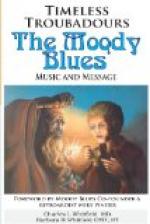Next in point of time is the troubadour Cercamon, of whom we know very little; his poems, as we have them, seem to fall between the years 1137 and 1152; one of them is a lament upon the death of William X. of Aquitaine, the son of the notorious Count of Poitiers, and another alludes to the marriage of Eleanor of Aquitaine, the daughter of William X. According to the Provencal biography he was the instructor of a more interesting and original troubadour Marcabrun, whose active life [43] extended from 1150 to 1195. Many of his poems are extremely obscure; he was one of the first to affect the trobar clus. He was also the author of violent invectives against the passion of love—
Que anc non amet neguna
Ni d’autra no fon amatz—
“Who never loved any woman nor was loved of any.” This aversion to the main theme of troubadour poetry is Marcabrun’s most striking characteristic.
Amors es mout de mal avi;
Mil homes a mortz ses glavi;
Dieus non fetz tant fort gramavi.
“Love is of a detestable lineage; he has killed thousands of men without a sword. God has created no more terrible enchanter.” These invectives may have been the outcome of personal disappointment; the theory has also been advanced that the troubadour idea of love had not yet secured universal recognition, and that Marcabrun is one who strove to prevent it from becoming the dominant theme of lyric poetry. His best known poem was the “Starling,” which consists of two parts, an unusual form of composition. In the first part the troubadour sends the starling to his love to reproach her for unfaithfulness, and to recommend himself to her favour; the bird returns, and in the second part offers excuses from the [44] lady and brings an invitation from her to a meeting the next day. Marcabrun knows the technical terms cortesia and mesura, which he defines: mesura, self-control or moderation, “consists in nicety of speech, courtesy in loving. He may boast of courtesy who can maintain moderation.” The poem concludes with a dedication to Jaufre Rudel—
Lo vers e.l son vueill envier
A’n Jaufre Rudel outra mar.
“The words and the tune I wish to send to Jaufre Rudel beyond the sea.”
This was the troubadour whom Petrarch has made famous—
Jaufre Rudel che uso la vela e’l
remo
A cercar la sua morte.
His romantic story is as follows in the words of the Provencal biography: “Jaufre Rudel of Blaya was a very noble man, the Prince of Blaya; he fell in love with the Countess of Tripoli, though he had never seen her, for the good report that he had of her from the pilgrims who came from Antioch, and he made many poems concerning her with good tunes but poor words.[18] And from desire to see her, he took the cross and went to sea. And in the ship great illness came upon him so that those who were with him thought that he was dead in the ship; but they




